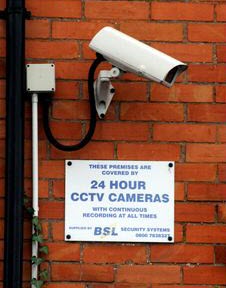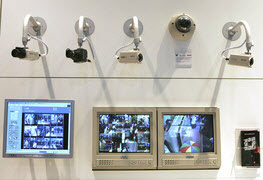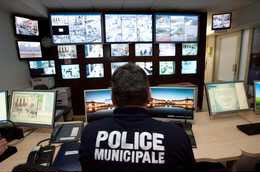CCTV for Your Peace of Mind

From a single camera and monitor to complex video surveillance systems with hundreds of cameras, multiple operators, and digital recorders, closed circuit television (CCTV) systems can provide security for a wide range of businesses. A good closed circuit TV system can make your business safer, more efficient, and less prone to theft and accidents.
While the most basic closed circuit TV setup - a single camera connected directly to a monitor and recorder - could help security in some cases, it is unlikely to be enough for most businesses. Most situations call for multiple cameras. In some cases, you may even want a movable camera to cover a large area. Before starting to compare systems or choose potential vendors, sit down and consider your video surveillance needs carefully. What do you want to monitor? General comings and goings? Vehicles? Do you want to see faces, merchandise, crowds? Once you decide what you want to see, choosing components will become easier.
The price of your system will vary considerably, depending on the lenses, housings, and installation options you choose. A very rough rule of thumb to use for pricing a complete, installed system is $500 to $1000 per camera, plus the cost of your recording device.
There are two primary ways to shop for the CCTV equipment you need for your surveillance system:
- Buy each piece of equipment separately. This takes quite a bit of time and research. You'll also have to ensure that each piece is compatible with the other components, although this method is often less expensive.
- Purchase surveillance equipment directly from the manufacturer. Although these are rarely complete, you can get most of the CCTV products you need from the same place, ensuring compatibility. You may have to pay a higher price for the convenience, but this method could mean fewer headaches since you won't have to track down certain components.
Security camera basics
Five pieces of CCTV equipment are the most critical for business security:
- Cameras - Record footage
- Lenses - Determine focus and clarity
- Recorders (DVR) - Store footage for future playback
- Monitors - Display footage at a security monitoring center
- Housings - Security, concealment, protection from elements
These devices are the central components that make your system work and must be compatible with the rest of a system.
Cameras
The most basic distinction to make when choosing business security cameras is whether you want color or black and white, but these days, it is a pretty easy decision. The advantages of black and white cameras used to be twofold: they were cheaper and they worked better in low light situations.

Prices for color security cameras have dropped and now many color cameras can switch to a black and white mode in low lighting. It's a no-brainer - you'll almost certainly want color security cameras for your business.
The other basic aspect of choosing business security cameras is deciding on format. Format refers to the size of the image processor in the camera - it can range from 1/4" to 1" or larger.
Video surveillance camera format can fall into two different categories:
- Closed circuit television. CCTV camera format will transmit a signal via cables to security monitors that cover a large area, like a hotel or retail store.
- Internet protocol. Wireless IP camera format will transmit a signal to any computer device for surveillance.
Lenses
The lenses you select for your CCTV system will depend on several factors. First, the focal length will play a large role in the angle of view provided by your cameras: The larger the size, the narrower the angle of view. For example, a 16mm lens will have a narrower view than a 12mm lens.
The focal length directly impacts the depth of field, which is the second consideration. When you have a high depth of field, most of the area your camera covers will be in good focus for viewing. CCTV lenses with a low depth of field produce poorer image quality, which will make much of your picture appear to be out of focus.
Video surveillance camera lenses
Unlike home video cameras, lenses are generally sold separately from business security cameras. The lens determines how wide an image is created and how much light is let in, so there are some important tradeoffs to consider.
- Fixed focal length lenses offer only one set field of view: To change the resulting image, you need to switch lenses. Fixed lenses are the least expensive and can't zoom in or out; most fixed lenses use CCTV format to record large areas.
- Variable focal length lenses and zoom lenses offer greater flexibility, allowing you to adjust your image's field of view via CCTV surveillance equipment. A manually adjustable focal length lens is also called a varifocal lens, used in environments with frequent lighting changes. Electrically powered variable lenses are otherwise called zoom lenses and can exceed 70 mm in CCTV format.
- Motorized zoom lenses give you the ability to control your camera remotely, zooming in for detail when you spot suspicious activity. However, they're only useful if someone will be watching and operating the cameras at all times. They are also the most expensive. A camera with a motorized zoom lens will most likely include bundled pan and tilt features for full range visibility.
Fortunately, lenses are usually interchangeable between different cameras so you can buy multiple types of lenses and experiment to find the best results. Just make sure the lenses you purchase match the format of your cameras: 1/4" lenses work best with 1/4" cameras.
Recorders
Recording is essential to the effectiveness of any closed circuit television system. Without recording, you need to have an employee watching a monitor at all times - hardly a cost-effective solution. And even if you spot suspicious activity, without a recording, you have nothing to use in court.
Only a few years ago, the universal solution was the familiar VCR. However, the introduction of digital video recorders (DVRs), which record onto hard drives instead of tape, has dramatically changed the situation. DVRs offer so many advantages over VCRs that they have rapidly taken over as the closed circuit TV recording solution of choice.
- Saved images last longer on DVR
- DVRs can instantly jump to any point in the recording
- DVRs can play and record at the same time
- You can set the DVR to automatically increase the recording quality when it detects motion
For businesses that do not want to constantly change tapes, DVRs are definitely the way to go. While security VCRs usually offer a time-lapse mode that lets them record for long periods of time, the resulting images are not a good record of events - they record only one snapshot every eight seconds. To get higher quality, you need to change tapes every day or more often. DVRs, on the other hand, can record for weeks or even months.
DVRs are considerably more expensive than VCRs, which is their only major drawback. DVRs generally start at $800 to $1500 and get more expensive the more memory and inputs you add. Good time-lapse VCRs designed for security use start at $300 to $400 and go up to $600 or more. (Regular household VCRs can't stand up to the constant use that security VCRs get.)
Monitors

The monitors you purchase for your CCTV system will depend on your specific business needs. You'll want a monitor that will not overheat or malfunction when running 24 hours a day, and it will also need to be large enough to support footage. For example, if you plan on running multiple feeds in display quadrants, a small monitor will not provide sufficient clarity to view all four pictures.
Many business owners choose flat-screen monitors to complement their CCTV equipment. A flat-screen device will take up less space in your monitoring area and will provide better clarity and resolution.
Housings
An important accessory to think about when buying business security cameras is the housing or enclosure for the intended environment.
Indoor housing is used to provide security or concealment and may include features like:
- Adjustable positioning
- Sturdy aluminum construction
- Protective glass window
- Tinted security dome
Outdoor housing will primarily provide protection from the elements, as well as features like:
- Weatherproof enclosure
- Sturdy aluminum construction
- Heat and fan mechanism for temperature stability
- Vandal-proof dome cover
The right kind of housing will vary with your application, and the security camera business you choose to work with should be able to help you choose the right one for your surveillance needs.
Ready to Compare Video Surveillance Systems Price Quotes?